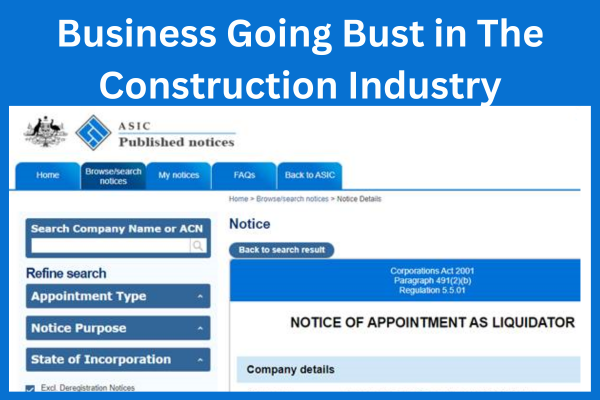With the announcement this month of Landmark Building & Developments (Qld) Pty Ltd going into liquidation, I thought it was timely to reiterate a few points. This article is geared towards tradies and subcontractors and if you’re a builder, then I’ve some tips for you below. Please understand two things: I am NOT anti- builders and I am not providing legal advice. If anyone needs a connection to a couple of construction lawyers, just ask.
In this article, I’m going to provide some super practical tips on protecting your tradie business:
Due Diligence
Before taking on any new large client (including a builder) do your due diligence. It might be asking other tradies what they are like to work with. Do they pay promptly? Is there anything negative online about them? These methods may not discover bad news yet to occur, until the proverbial hits the fan. Having said that, you can pay for a credit check service.
Contracts
Contracts are legal documents; be absolutely sure to scour before signing. Ideally, involve your solicitor (especially if it’s a large job) or at the very least, if there is something in the contract you don’t understand, ask your solicitor (not those who provided the contract). If you’ve worked for the business previously, don’t assume each new contract provided to you will be the same as the last. Anyone who provides you with their contract (versus say an industry body contract) is most likely going to slant it in their favour, so ensure you thoroughly read every contract and nothing new has been slipped in. Likewise, if a customer won’t sign your (presumably fair) contract, are they sending you a clear message of their own intentions?
Cap the Credit you Offer
If you work with a client, principal contractor or builder, I recommend you don’t let the money owing get too large. If letting the amount that they owe you get up to say $70K and if that didn’t get paid, how would that affect you? Consider not only your own ability to stay solvent, but your personal health and business well-being. Would losing a huge chunk affect your ability to hold onto your home, or your relationship with your significant other? Every individual is different, $20K might be your limit, or perhaps $200K. Set credit limits per customer in your business and stick to them. Remember, what you invoice someone means little; it’s what you are paid that truly counts.

Share the Love
Rather than working for one single customer, principal contractor or builder, spread your work around and work for a few; that way if one goes bust, then you won’t have all your potential income AND all your money owing lost. Don’t expect these days to even get 10c in the dollar back; once they go to the wall, you cannot legally ask to be paid and reality is you’ll see nothing back.
Invoicing, Clawbacks & Debt Collection
Invoice promptly and frequently. Don’t be so busy working that you let invoicing slide. Be aware also that if you’ve been paid by a company that goes into liquidation, the Liquidator can claw back your payment up to 6 months from when you were paid. That’s right, the money you earned, were owed and were rightly paid, might be demanded back by the Liquidator. You can fight it, but it will be a fight. If you began chasing them because you had a bad feeling (or perhaps insider information) that’s the grounds (I believe) for the clawback. So, if you’re always diligent chasing money, make sure you keep records and you can show a consistent pattern that you chase every debtor once overdue – there wasn’t anything special about you chasing this one – you do it all the time. Have a solid debt collection process in any case and be sure you document and follow it consistently.
Freeze Services
Stop work and don’t proceed any further if you have money owing. I know, you might get the line from the builder or principal contractor that if you just do the work, the builder can put in the next claim and then you’ll get paid. I’ve known a few tradies over the years who obliged and lost out. Not saying you’ll lose every time, but these days, if you’re not being paid promptly, then you should consider if it’s wise to throw good money after bad. If you genuinely believe they will do right by you, then negotiate half now and half when they get paid. I should say, this is not about you holding another business to ‘ransom’ but about being smart about your own business finances.
Negotiate
Quite honestly, many tradies are not willing to work for builders these days, so builders are struggling to find good tradies. On this note, IF you choose to work for a builder, negotiate your terms, that is, you get paid say 14 days from invoice date, NOT 30 days EOM (which is essentially 60+ days). Years ago, builders could set the rules (and did) but as they scramble for qualified tradies, they will be more willing to negotiate. If one won’t, then perhaps you should wonder why they are trying to drag out payment. Ask yourself, is that the builder you want to work for?
Ditch the D’s
Cull ‘D Grade’ clients regularly. By a ‘D Grade’ client, I am talking about the client who demands the most, perhaps is painful to work with or is unreasonable, likely pays the lowest rate, short pays you or pays you late, or drags out payment. They are what I call ‘D Grade’ clients. They should be identified quickly and essentially ditched. There is a process in ‘ditching’ a client, which can be different for each business.
Avoid Bankruptcy
Landmark sadly isn’t the first this year to go into liquidation and I am very sure, will not be the last. When a larger business goes bust, there is often a ripple effect of subbies and tradies beneath them who also may go under. This IS a serious matter and one to be concerned about. If you think that going into bankruptcy is ok or an easy ‘out’ – think again – there are consequences. Check out this link. Am I trying to ‘scare’ you? Absolutely!
If you’re a builder …
The building industry is very small – that is – a reputation for being a bad payer gets around. If you want to be the builder that tradies will drop almost anything to do your work (versus someone else’) then here are some tips:
- Pay fair rates. I’m not saying be ‘ripped off’ but if the tradie can’t make a dollar at the end of the day, then they won’t stick around, or they will fold themselves because they are losing money, which means in both cases, you will lose them. Obviously, you will need to quote appropriately.
- Pay promptly. Tradies especially look at this one. If you pay promptly, they will bend over backwards to help you; drag them out, and well, don’t be surprised if they just are not available next time you ask them to do a job.
- Be clear about expectations, communicate well, be professional and be organised. Plan well, so that if you book someone in for a specific date, it will happen, or otherwise, you let them know with as much notice as possible.
Need help? This and much more are covered in my business coaching services – Australia wide. Visit my Contact Page.
Read Strategy in Business: Why It’s Critical and How to Action It.






